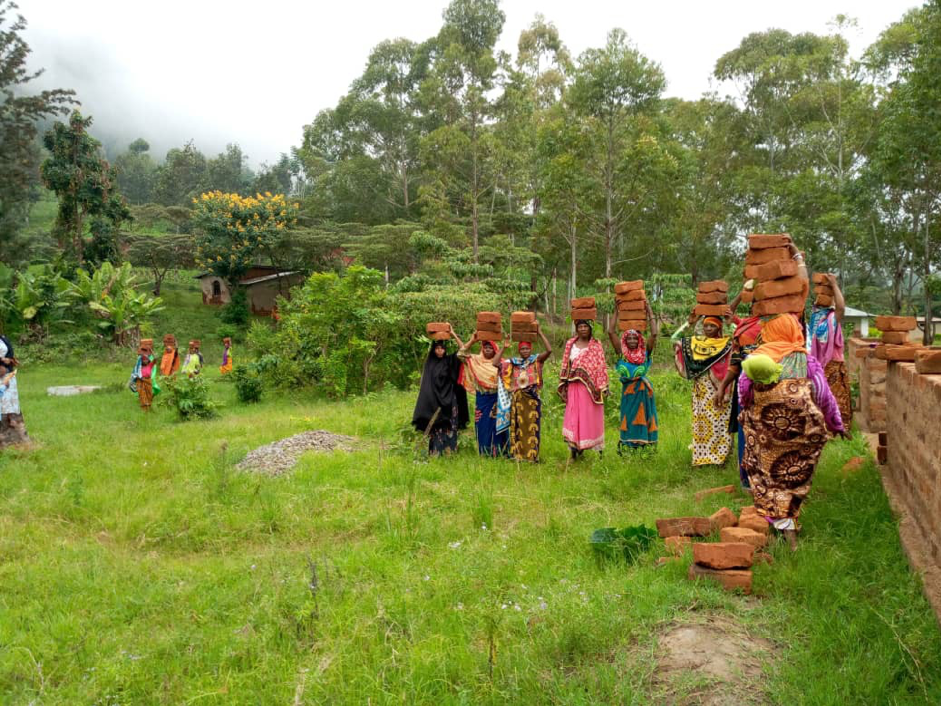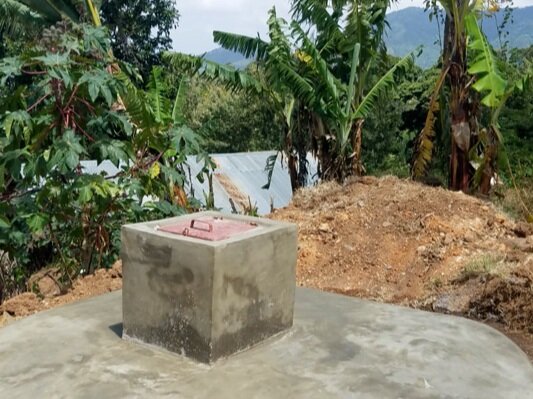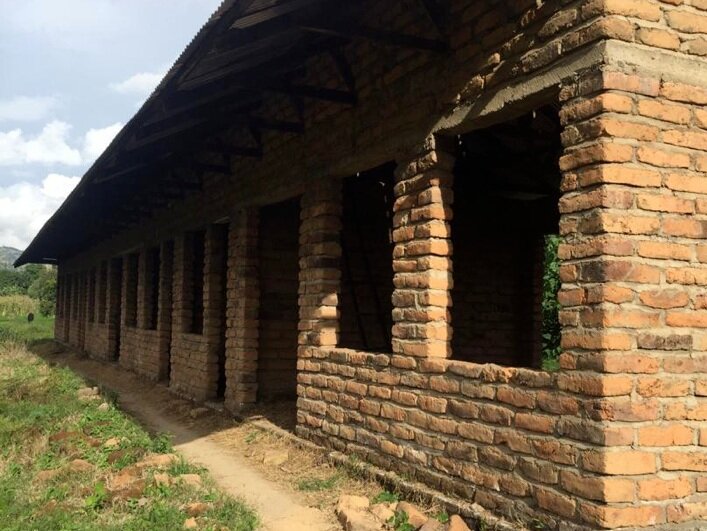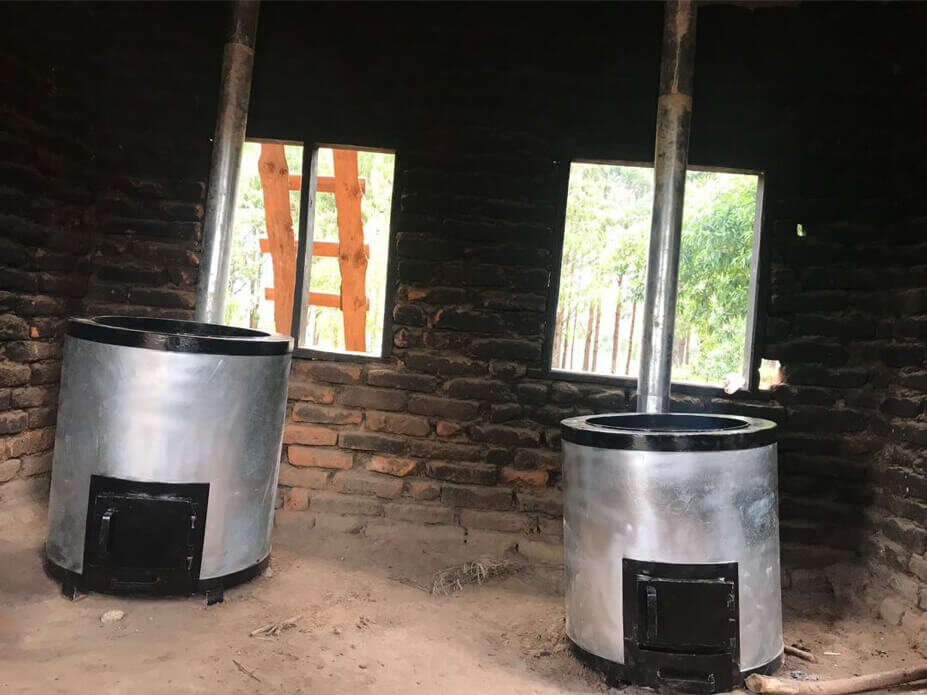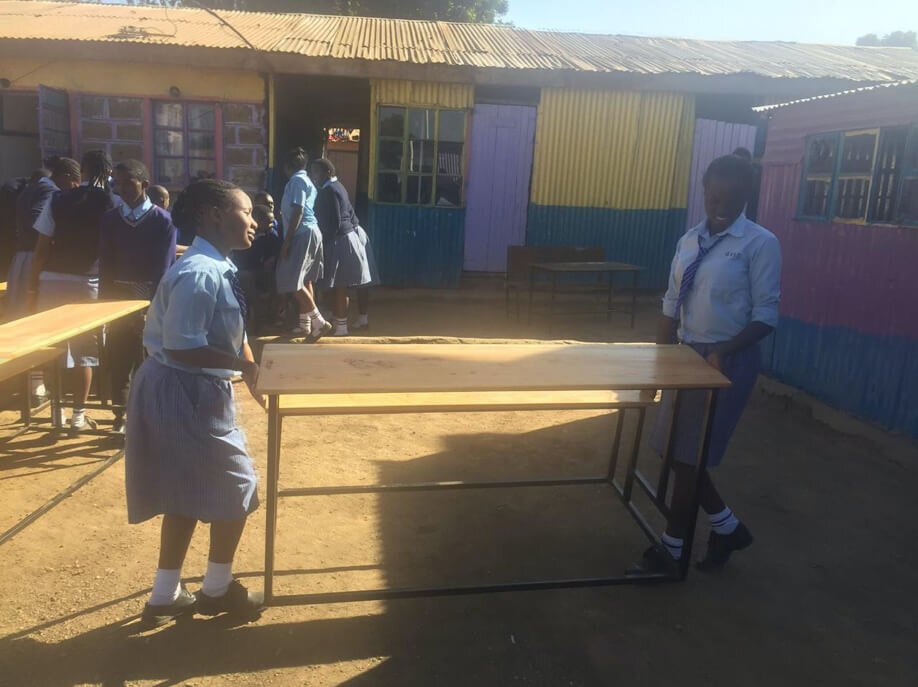2019 update
A brief overview
Registering Improving Tanzania Foundation
We established the Tanzanian NGO in the first half of 2019 to give us more certainty and legitimacy in the eyes of government officials. Rumors had been spread by a nearby unfriendly hotel, which saw its profits sinking because, in the light of our activities, they could no longer claim to be the sole ‘saviour’ (as they would put it!) of Mambo village and was thus less able to milk their guests for money, which did not see the light of day in the village anyway.
We were more bemused than alarmed, but decided it was important to ensure that the situation did not escalate to a point where we were disadvantaged by an unethical and determined foe. The new NGO is expected to be registered by late May, 2019.
Pamoja tunaweza - Together we can!
Education
In late 2018, upon assessing the success of projects of that year, clearly our standout failure was the complete lack of progress in abolishing corporal punishment (hereafter referred to by its Swahili name ‘chapa‘) in the schools. For more than a year, the subject had been discussed ad nauseam with heads of school and teachers at every school visited. But there was not one success story to be told. It was time for a change of tactics.
As of the beginning of 2019, FWF would let it be known that it would no longer support any projects at schools that practised chapa. Our strategy would now be to incentivise schools with promises of generous support should they abolish the abomination of chapa.
Clearly, introducing such a massive change to the teaching method would not be easy. Many schools have a student:teacher ratio approaching 100:1 and the challenge for teachers could not be underestimated.
However, we have since been able to develop a network of heads of schools who are willing to mentor their associates in this process. And, new disciplinary structures have become an intricate part of the change, by which students are given tasks after school during which, hopefully, some reflection on their behaviour takes place. But, of course, the change we request is significant and takes time.
Nonetheless, we have been pleasantly surprised by the ever increasing support we have received and are definitely not a lone voice in the wilderness. Teachers, district education officials and parents have all expressed the desire for change. We fervently believe history is on our side!
Also, of no surprise was the universal agreement of Peace Corps Volunteers (PCVs) that the practice of chapa was an abuse of the human rights of the school children. Whereas the PCVs need to be somewhat cautious in their reactions to chapa - due to their understandable need to maintain acceptance in the village in which they live permanently - no such impediment applied to us. The PCVs were often the message bearers, but as we were at pains to make clear, in the face of any blowback, the responsibility for the message itself, rested solely with FWF. However, the feared reactions have not arisen. Not at all.
We were adamant that the change should be permanent and required schools to demonstrate their strong commitment before we demonstrated our own reactive commitment to them.
A typical classroom that demonstrates the challenges faced by resource-poor schools and demonstrates a clear need for FWF support.
Compared to a well-resourced school.
Health
According to WHO statistics, five million children die every year before the age of five in sub-Saharan Africa. Five countries are responsible for half of these mainly avoidable deaths - DRC, Ethiopia, Nigeria, South Africa and Tanzania.
Leading causes of death in Tanzania are malaria, respiratory diseases, HIV/AIDS, anaemia and cardio/circulatory diseases.
Fortunately things are improving with life expectancy in Tanzania rising to nearly 66 years, compared to 57 years in the mid-2000s. But there remains much to be done.
Thus, confronted with the perilous state of health care in Tanzania for many people, it is a given that we support health clinics as much as possible - particularly in isolated rural villages where health services are at their most basic. This support is reflected in our increased willingness to complete health clinic buildings and subsequently equip the clinics with diagnostic tools to better care for people.
As reported below, the reactions varied from village to village, school to school. But most were at least willing to seriously consider the issues involved. Patience is a virtue, but thankfully it was not always required.
We are indebted!
Many of the projects described below would not exist but for the dedication, kindness and generosity of the intrepid Peace Corps Volunteers (PCVs) who give years of their life in combating poverty and injustice in our world. FWF is deeply indebted to them for their willingness to engage with us in working towards a fairer world.
A special welcome to the new Board of Fair World Foundation Tanzania: Henrish Madambo (Chair), Fatuma Magwagu (Secretary), Sr. Archangel Shaya (Treasurer), Neema Safieli and Margreth Clemence. They will determine our future.
In particular, Henrish Madambo‘s contribution to the day-to-day functioning of FWF is a sine qua non of the Foundation.
Pamoja tunaweza!
The Villages in the Usambara Mountains and Lushoto District
Mambo
FWF first began working in Mambo in 2016 by installing three small bridges on an important road linking Mambo and nearby Nkukai village. In the meantime, we have been involved in projects in the schools and the health clinic.
The Women’s Ward building at the village Health Centre had remained incomplete for many years. It changed its name from a men’s ward to a women’s ward (sic) when we took over the task of completing it in early 2018. However, we had to wait for beds to become available for purchase in Dar es Salaam and it was April 2019 before we could install four beds and screens to get the ward fully functional.
The ward was newly designated primarily for pre- and post-natal usage. However, during the building an emergency occurred. A village mother rushed in to say she was giving birth and could the tradesmen please leave. They did so and a beautiful healthy boy was soon brought into this world on the bench, above, amidst the rubble. Such dangers were about to be eliminated.
Mambo village is also the home of MamboMee women‘s group which we first established in 2010. The group has gone through some iterations but, with the help of a two-million shilling soft loan (no interest payable) has recently set up a small cafe in the village in which it sells yoghurt. Recently we brain-stormed with them to explore way of expanding their income. We came up with the idea of a popcorn machine and have recently purchased one. Hopefully, they will extinguish their debt quickly.
Finally, in the dry season up to 3,000 people rely on one, thankfully reliable, well for their water supply. Apart from the obvious dangers associated with a lack of hygiene, the physical demands placed on children to extract the water are unconscionable. We plan to install a water pump there as soon as possible.
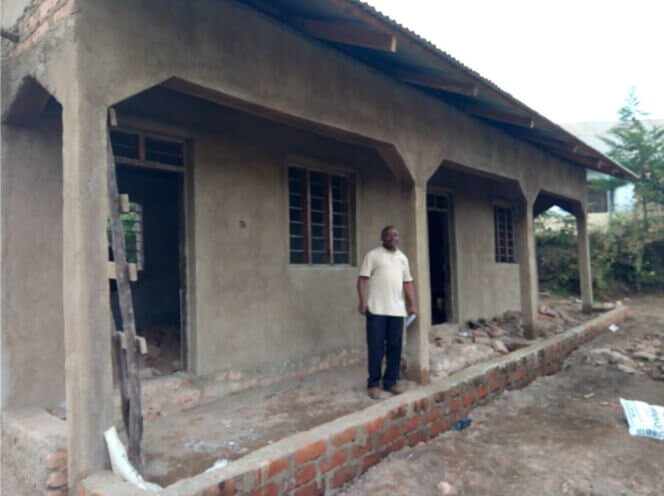
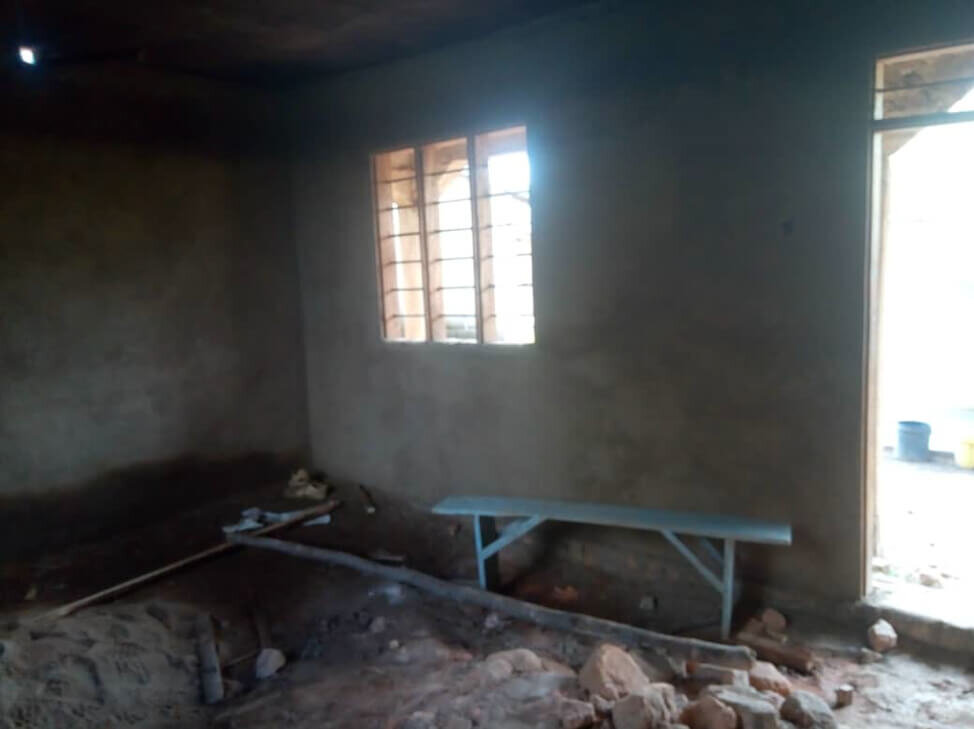
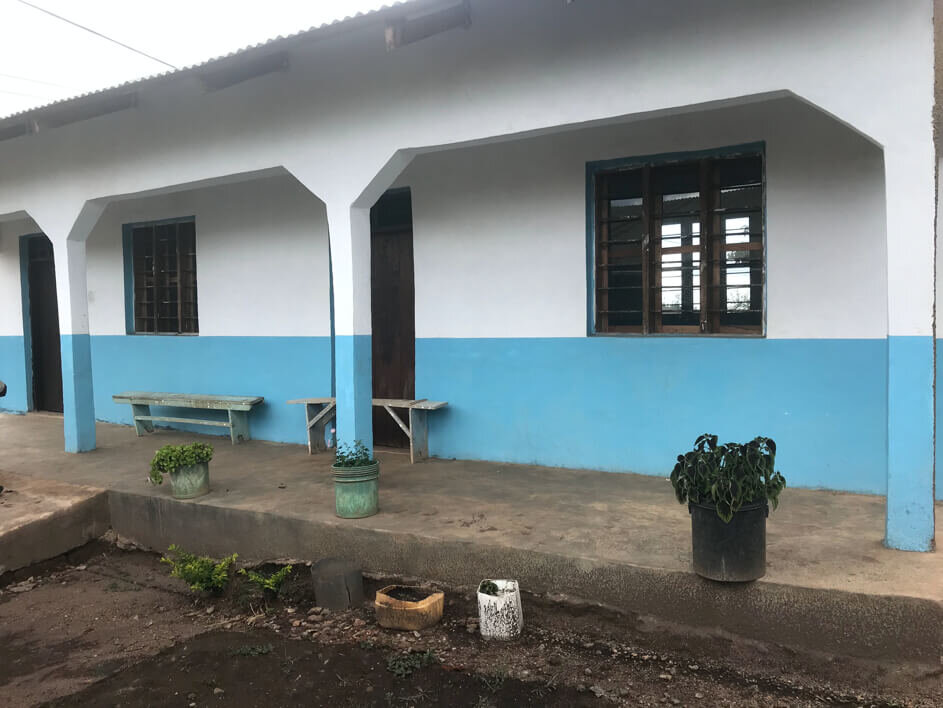
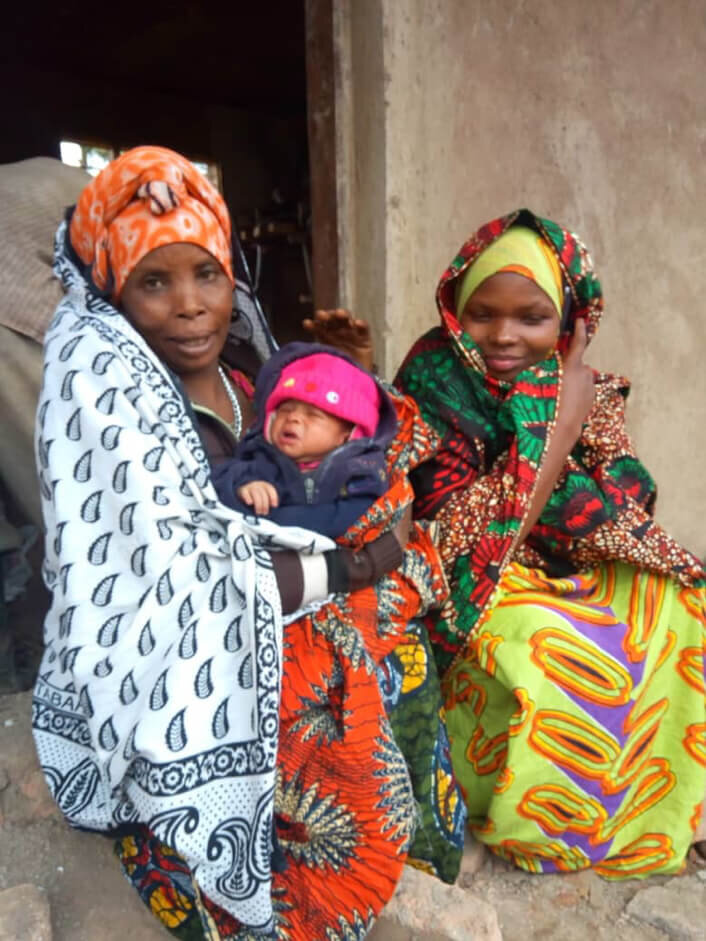
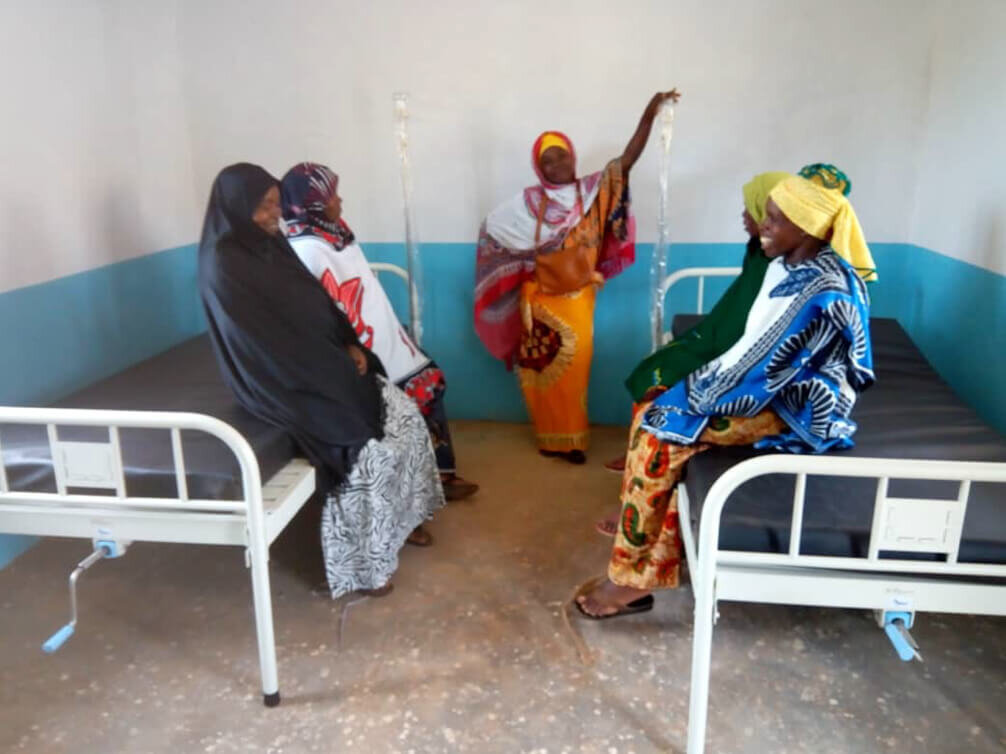
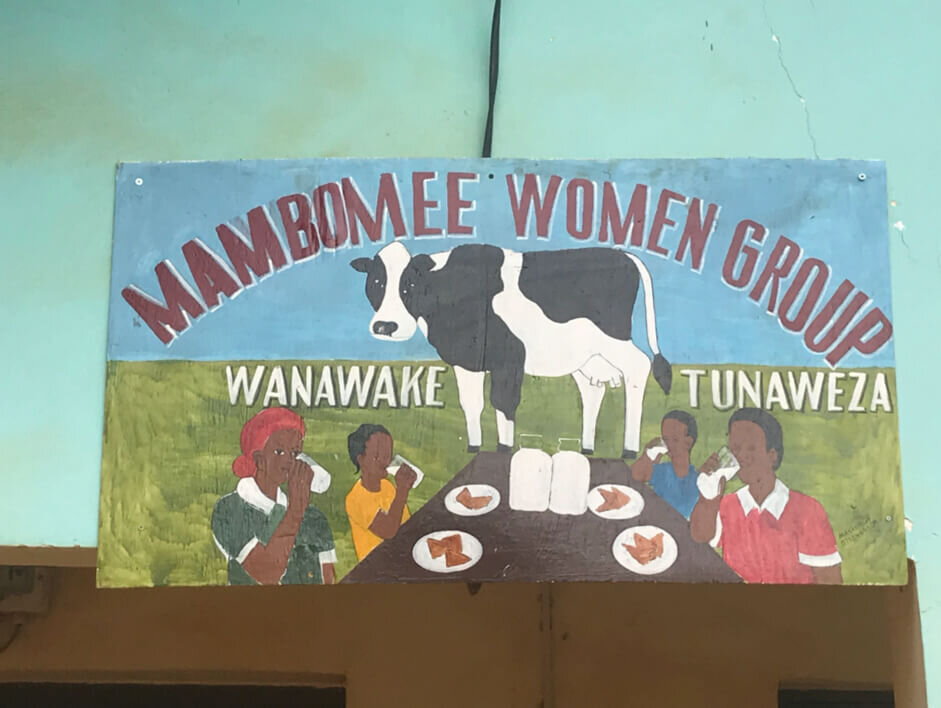
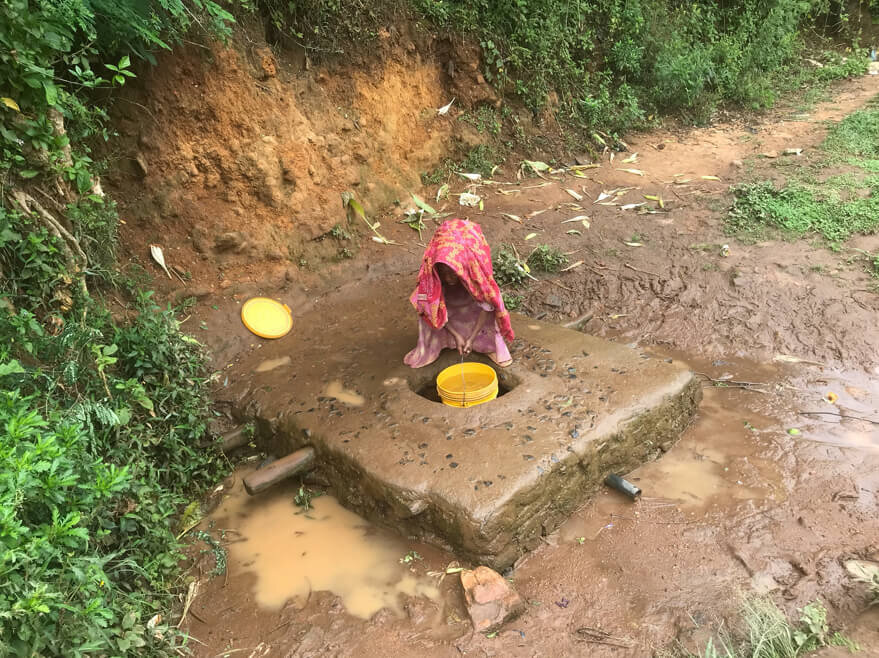
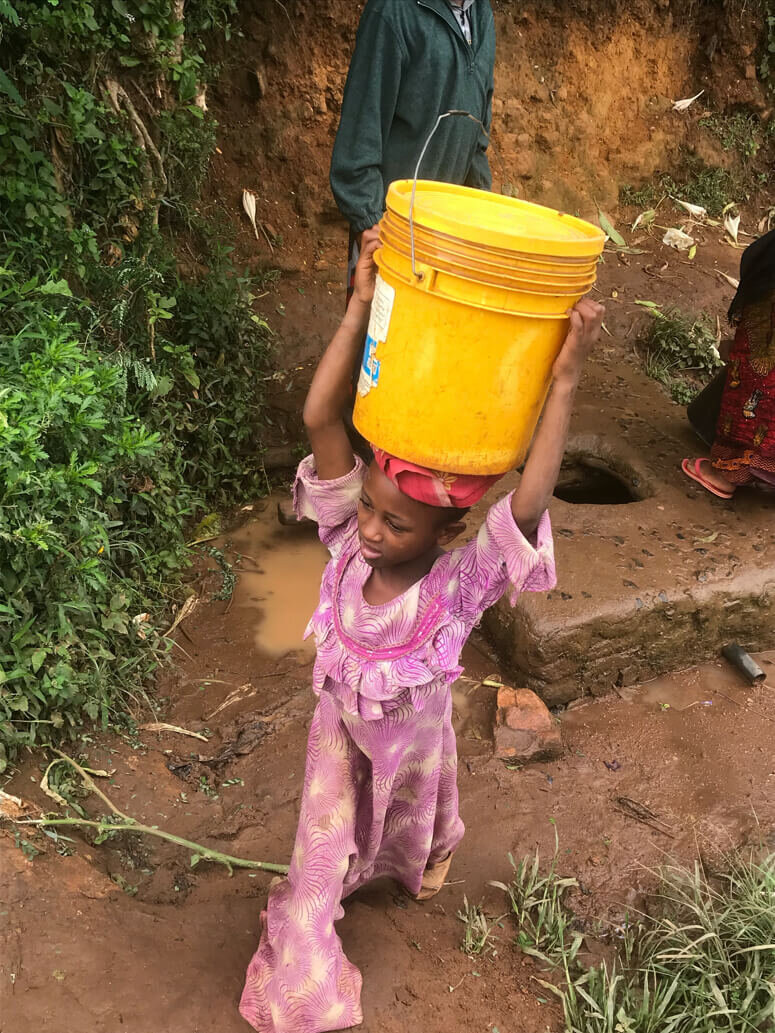
Mtii
Mtii is home to the MotoMoto women’s group which has been making yoghurt since they first partook in our course in 2013. Last year we together jointly purchased a cow which produced a beautiful calf last December.
With the cow providing a more certain source of good milk, the group recently expanded by opening an outlet in the neighbouring village of Mtae which, unlike Mtii, has electricity. In May 2019 we jointly purchased refrigeration for this outlet which will enable the women to provide a higher quality product.
Mtii inhabitants have long wished for the completion of their health clinic building, but the project has been plagued by corruption and dishonesty. However, with Henrish’s oversight, we now feel confident that we may can proceed with the completion of this project. All being well, we will reach completion date before end 2019.
Sunga
Since 2018 we have been supporting the health clinic and primary school in Sunga. In May we installed the following equipment in the health clinic: an adult weighing scale, haemoglobin machine, new battery for the solar system, and strips for the glucose machine.
Work has begun to connect water to the doctor’s house, the clinic toilets, and we have already installed a second water tank for the clinic itself.
Early in 2019, we installed a water catchment tank at the primary school and the required taps for drinking and hand washing. Work has also begun to reinforce a small bridge providing access to the school and to make access for children safer.
Rangwi
The Rangwi Clinic is operated by the Sisters of the Usambara and is visited by Sister Archangel, one of our founding directors of FWFT. She is a surgeon who practices general medicine at the clinic as well. She asked us to provide the clinic with a fridge to preserve vaccinations, an electric autoclave, and a suction machine. These were delivered in May 2019.
Mpanga
After completing the construction of the health clinic in Mpanga late in 2018, we have now gone about equipping it. The latest equipment delivery consisted of: Glucose machine, Haemoglobin machine, BP machine with stethoscope, thermometers, and tourniquets.
Mtae
Earlier this year, we finished installing windows to three classroom in the Secondary School - a project beset with issues that prolonged it for almost a year. With our new policy in place, we now await the school to abolish chapa before we consider continuing to renovate the classrooms.
Kalumele
Kalumele is where we were first alerted by the PCV in 2017 to the existence of the wide-spread practice of canning in the schools. By chance, we met the headmaster of Kalumele Secondary in Lushoto recently. He told us he had just been to the Ministry of Education to request the transfer the last teacher at his school who wanted to chapa his students. This occurred quickly and the school is now free from this terrible practice.
In May 2019, we purchased a 150 watt solar system with phone charging attachments for the school, plus, two soccer balls.
Kizara
Kizara is our latest village whose need to complete their health clinic was brought to our attention by Fatuma Magwagu who, as well as a founding member of FWFT, is also the Ward Executive Officer responsible for a number of villages in this region.
After meeting with the village leadership, we are confident the need is real, the villagers want it and are ready to contribute in significant ways.
The village agreed to provide bricks, sand, and rocks for the project, as well as provide labour to support the tradesmen. Encouraged by this demonstration of cooperation, within days, we had a workable budget, bricks were being delivered, and the men were (apparently) planning to get to work as well! Stage 1 will bring the walls. up to roof level and requires 10 days work and should be completed by end May.
Mavumo
We have been active in Mavumo most of this past year. The Peace Corps volunteer was simply amazing in her dedication and motivation in bringing projects for discussion. In her two years in the village, she distributed well over 100 Days for Girls kits (made in Australia) which gave girls the chance to improve their education by allowing them to stay at school during menstruation times. The kits were accompanied by training in empowering the girls for life’s challenges.
A project to replace deteriorating water pipes vital to the village water supply. It took about four months to complete and involved approximately 40 villagers who contributed their labour.
Also in the village primary school, water catchment infrastructure for toilets and hand-washing stations was installed earlier in 2019. The school headmaster recently told us that the school no longer practices corporal punishment.
A new Peace Corps volunteer has just arrived in the village. She will need time to settle in before we find new projects to develop.
Villages in the Southern Highlands
Idimi
Idimi has asked us to help complete their health clinic and help to renovate two classrooms. A local government architect has drawn up a budget for both. However, in our experience, government officials typically have an exaggerated opinion as to how much foreign NGOs are willing to pay for projects. A quick perusal of the tendered budgets does not change our opinion on this.
Henrish will visit the site in late May to assess the situation and, all being well, create a realistic budget.
Iwowo
We have agreed to install a placenta pit for the village health centre as well as an incinerator and equipment including an Haemoglobin machine, an autoclave, and a water tank.
The schools (government primary and community secondary) still practise chapa and need to transition before we will support them. In particular, the community secondary school is in need of 75 single desks and chairs, water connections and renovations.
Horongo
Horongo too has an unfinished building that will become their health clinic. Henrish will inspect it in late May and assess the willingness of the village to contribute seriously to a completion process.
Chilonwa
Chilonwa is a village outside of Dodoma the capital of Tanzania. After the first request for support in January 2019, the Secondary school demonstrated it was very open to abolishing chapa. It quickly set up alternative systems of discipline, (the PCV supervised detention for the first month), and announced the changes to the student body - all with the support of the teaching community.
By May we were convinced that the new system would be sustainable. We bought the school a much needed photocopier/ printer and have ongoing contact through the PCV to provide further support.
Idunda
The Peace Corps volunteer will organize an HIV/AIDS awareness soccer tournament shortly. We supported such an event in the village of Milo two years ago. It is difficult to judge the effect of such an awareness-raising event statistically. However, undisputed is the need to raise awareness as the HIV infection rate in Tanzania is 4,5%, causing 32,000 deaths annually. 65,000 new cases were reported in 2017.
The stigma attached to HIV infection can also be addressed by such events, thus increasing the quality of life of people living with HIV. We will continue to support such events.
Ivigo
Sadly, the Peace Corps Volunteer in Ivigo was medically evacuated last year, thus limiting our communication with the village.
However, the primary school has since made approaches to the PCV in the neighbouring village of Idunda, hoping FWF would fund the installation of cooking pots to be used to prepare lunches for the students. We installed them in two other schools including Idunda late last year.
However, the school has yet to convince us that it has abolished chapa. A new PCV has is now settling into the village and we hope to make progress soon.
Njelenje
A recent visit to Njelenje resulted in FWF providing the health clinic with a haemoglobin machine, an electric autoclave and sphygmomanometer. The village has expressed the desire to upgrade its water infrastructure and Henrish will inspect and talk further about this soon.
The primary school has eight classroom in poor condition and would require painting, floor repairs, and window glass replacements. Some rooms also need ceiling boards. However, traditionally chapa has been practised in the school and it has just begun to take initial steps to change that. Time will tell if we can support this school.
Matema Beach
The school in Matema Beach requires a complete upgrade of its solar electricity system. Over the past few months, the school has slowly moved towards reducing the incidence of chapa.
The PCV has written recently to say that chapa has been reduced by 90%. Once that figure becomes 100% we will be in a position to act.
Malombwe
Malombwe Primary School has been chapa-free for 10 years. In the head of school and the teachers, we discovered passionate practitioners of chapa-free teaching. And it is immediately obvious when one enters the school grounds that things are different here. The grounds are immaculately kept, as are the classrooms with the walls festooned with teaching aids. The teachers say they have the same regard for their students as they would for their own children, that the students also teach them, and that there is mutual trust and respect between students and teachers.
The head of school has been happy to provide advice to quite a few other heads of school who are struggling to find a way to be chapa-free.
We recently delivered a photocopier/printer to the school which will facilitate everyday teaching.
We are also planning to improve water accessibility for the Malombwe school generally and for the teachers in particular. Also in the village, one of two water pumps is not functioning and will be repaired.
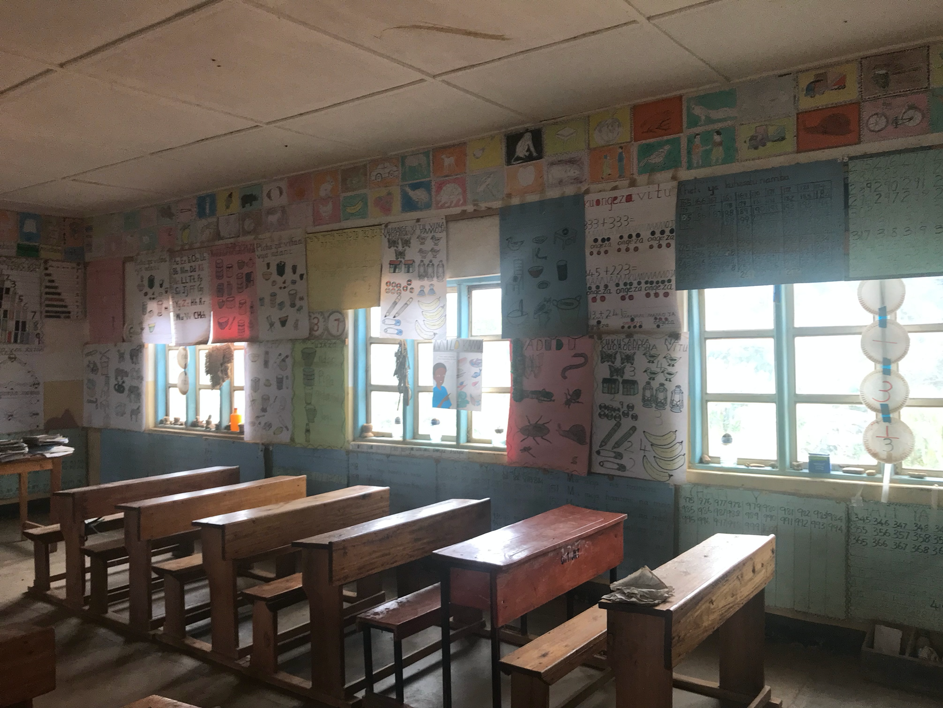
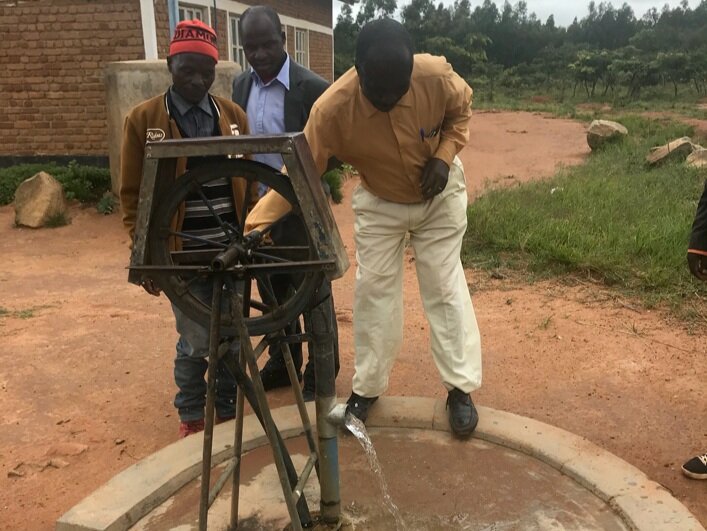
Mashese
In February this year, Mashese’s Ilungu primary school submitted a budget for renovation of classrooms a budget which unfortunately was judged to be excessive. By April the budget had been re- formulated and work began.
However, by May the tradesman was disputing the amount of cement he needed. The situation will remain unresolved until Henrish visits the site at the end of this month.
Mambegu
Mambegu primary school has steadfastly refused to abolish chapa and, as the PCV has written, it will take a change of leadership at the school to bring about a different situation. We move on.
The PCV has expressed an interest in forming a women’s group to make yoghurt. And a ‘Happy Cows, Happy Farmers’ project seems to be also a possibility. Both projects would form part of a visit to Mambegu this coming November.
Ninga
The renovation of classrooms in Ninga face similar issues to those in Mashese. The original budget was unacceptable to us. However, the exaggeration was so excessive, we asked for the tradesman to be replaced as trust had been breached.
Henrish will visit soon to try to reestablish trust and create an acceptable budget.
Wanginyi
The primary school is taking serious steps to eliminate chapa and we are optimistic that it will succeed.
The number one priority for the school may be a room in which the students can have their midday meal. There is currently a disused classroom (above) which could be converted for this purpose. This would entail fitting ceiling boards, windows, painting and raising the external walls to seal off the roof. There are two such classrooms in need of this work.
Or perhaps we could begin with the installation of cooking pots for cooking uji (porridge) and maharaje (beans). This would also have the advantage of using less wood and be a more healthy environment for the cooks - smoke free. And, of course, be conducive to seeing that the children are fed at lunchtime.
The village itself is hoping to upgrade its water infrastructure including installation of an electric pump. We have asked the village to obtain a quote from the electricity supplier TANESCO.
Mhezi
After conducting a ‘Happy Cows, Happy Farmers’ projects in Mhezi late in 2018, a visit to the village in March indicated improvements in the cows’ welfare. We took the opportunity to discuss with the Regional Agricultural Officer the possibility of introducing stuns guns to give the cows an ethical death (no knowledge, no fear, no pain). This will be difficult but not impossible.
After visiting the health clinic to inspect the placenta pit that had been installed late last year, we were alerted to the need for a Glucose machine to test for diabetes in the village. This was subsequently delivered in March 2019.

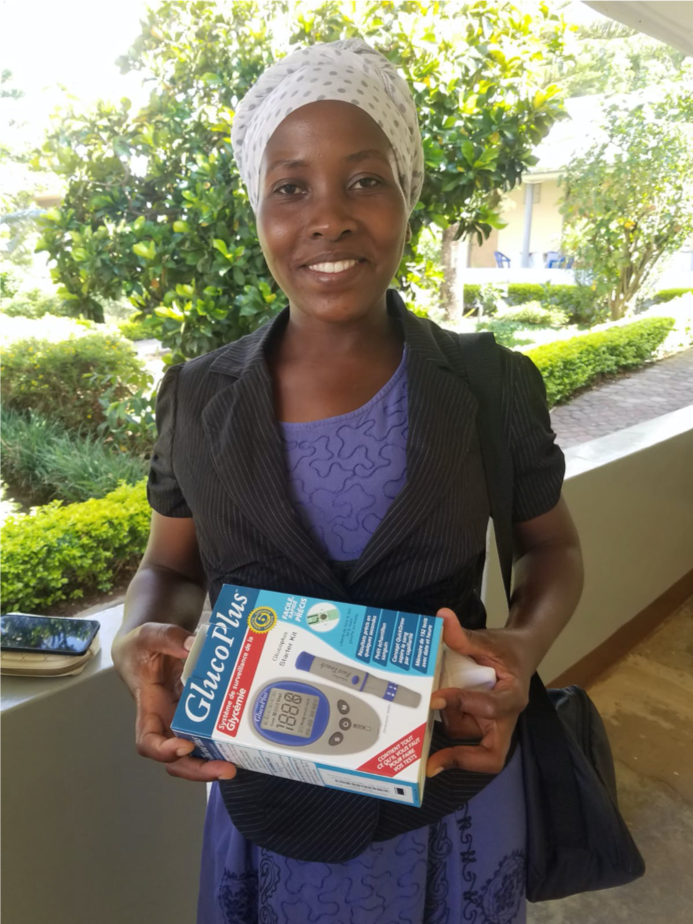
Ipilimo
In December 2018, a message from a PCV arrived on WhatsApp. Here is what he wrote:
“I have run into some issues with a water project I am doing, and know you have helped a lot of other volunteers with projects, so figured I'd reach out to see if there was any way you/fair world could assist me.
My Project was a combined Gardening, Nutrition, and Water project. The gardening and nutrition aspects went very smoothly and we conducted 10 agriculture classes and 5 nutrition classes, all with 40-60 people in attendance. We then supplied seeds to everyone who attended the sessions and helped them plant their own home gardens.
The water portion of the project aimed to put solar pumps in three existing wells spread throughout the village, use those pumps to pump the water up to tanks on stands 20 feet in the air, and then use gravity pressure and hoses to supply water from those tanks to 30 houses.
The project was originally supposed to be completed in May 2018, but the water engineer we are working with purchased supplies from a shop in Dar, and then the shop was subsequently closed by Tanzanian Revenue Authority.
It has been a long process with a ton of delays trying to get the shop to return the money so we can implement the project, but we have successfully built the stands for the tanks, bought hoses, and installed solar panels and batteries and solar pumps.
The issue we are having is that the shop is out of money and while we have applied legal pressure they are unable to return the final amount of money needed to buy and install three tanks. I am in the last 4 months of my service and desperate to successfully finish the project...please let me know if there is anything you can do to help!”
Before Eric left the village for good in March 2019, we had worked together to purchase and install the missing tanks and fittings.
Nairobi, Kenya
A former PCV is now living in Nairobi asked for help in supplying desks to an orphanage situated just outside the city.
Early in 2019 we supplied desks and food to the school there.







